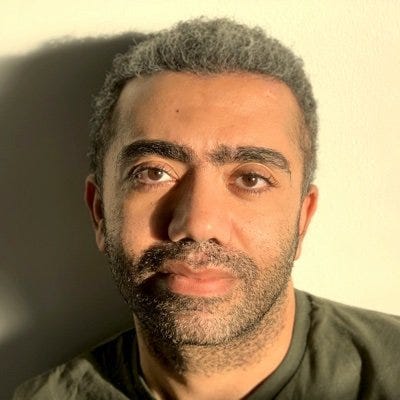Ahmed Al Omran (AAO) is a friend of WITI. He currently serves as a correspondent for our beloved FT, covering Saudi Arabia and the wider Gulf. He lives in Jeddah. -Colin (CJN)
Tell us about yourself.
I’m a journalist working as a correspondent for the Financial Times, where I cover Saudi Arabia and the Gulf region. Previously worked for The Wall Street Journal, and my byline has also appeared in The New York Times, the Guardian, Foreign Policy, and Monocle, among others. I’m based in Jeddah, a port city on the Red Sea.
Describe your media diet.
I usually start my day by skimming through local papers and websites to stay on top of the news. I use NetNewsWire to subscribe to RSS feeds, including Google News search terms for different countries to keep an eye on how international media is covering the region, in addition to dozens of tech and design blogs like Kottke.org, Scripting.com, Daring Fireball , and UnderConsideration’s Brand New.
I subscribe to many newsletters but don’t keep up with most of them. The few newsletters that I try not to miss include Stratechery, Rest of World, Dense Discovery, and Rory Smith’s On Soccer. On the podcast front, I listen to The Daily by NYT, Decoder with Nilay Patel, Media Confidential, several Arabic-language podcasts from the local Thmanyah network, and a few soccer-related pods including Arsecast Extra and ArsenalVision. I also use the Matter app to save long-form pieces to read later.
Twitter has been a dumpster fire since the Musk takeover but it is still useful to keep my ear on the pulse of local conversations. I don’t use TikTok (tried and failed), but I do follow several local influencers on Snapchat, and I typically scroll Instagram for 30 minutes before bedtime. I don’t watch much TV. My main consumption of television content is live sports and occasionally monitoring the streams of state-owned channels when there is breaking news or current events that I need to monitor.
What’s the last great book you read?
“It’s Not TV: The Spectacular Rise, Revolution, and Future of HBO” by Felix Gillette and John Koblin. The Wire was one of the few shows that I binge-watched many years ago, and this book provides great insight into the company’s history, how it has managed to keep making TV hits, and the ongoing challenges that came with the rise of Netflix and the streaming model.
What are you reading now?
“Vision or Mirage: Saudi Arabia at the Crossroads” by David Rundell, who was the longest-serving US diplomat in the kingdom. Some of his conclusions can make me go huh? but I think it is useful to see my country from an outsider’s perspective. In particular, I keep checking the endnotes and the bibliography section because he cites some interesting and unfamiliar sources.
What’s your reading strategy when you pick up a print copy of your favorite publication?
I don’t read much in print these days. The exception is when I pick up newspapers and magazines from airports when I travel abroad. I usually look at the headlines and flip through the publication, identifying stories that seem potentially relevant to me, then try to read them. Not a completist by any means, and if a story doesn’t keep me hooked I quickly move on to the next one.
Who should everyone be reading that they’re not?
Mohammed T. Alsudairi is a friend and scholar who focuses on the relationship between China and the Middle East. His research covers politics, religion, and culture, and it will help you understand the growing role of China in the region, including its latest mediation between Saudi Arabia and Iran.
What is the best non-famous app you love on your phone?
Endel, an app that uses AI to generate personalized soundscapes based on movement, time of day, weather, location, and other factors. I usually use it when I work in cafes and need to focus by blocking out other noises.
Plane or train?
Train, although it has been a while since I took any trains because most destinations in Saudi Arabia and the Gulf require flying. Other than shorter travel time, I find almost every aspect of flying and airports unpleasant these days.
What is one place everyone should visit?
Japan. The way the Japanese obsess about their craft means there is no shortage of unique and satisfying experiences that you can have in one country. Culture, nature, urban planning, transport, food, clothing, stationery. So many things to admire and enjoy.
Tell us the story of a rabbit hole you fell deep into.
A few weeks ago I decided to hand-code my personal website after several years of depending on ready-made fancy content management systems designed for portfolio websites. I don’t have any technical background, but I taught myself a bit of HTML and CSS when I was a teenager and so I decided it is time to try to see if I can still do it. It took me several days of trial and error, the site is all-text and very much barebones, but hey it does exist now and I made it from scratch! (AAO)
—
Thanks for reading,
Noah (NRB) & Colin (CJN)
—
Why is this interesting? is a daily email from Noah Brier & Colin Nagy (and friends!) about interesting things. If you’ve enjoyed this edition, please consider forwarding it to a friend. If you’re reading it for the first time, consider subscribing.




